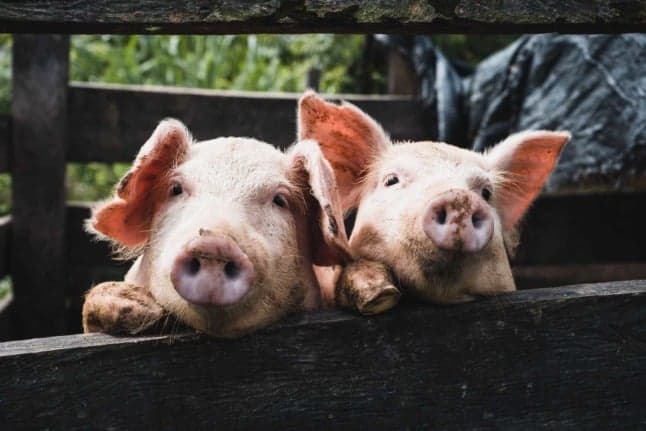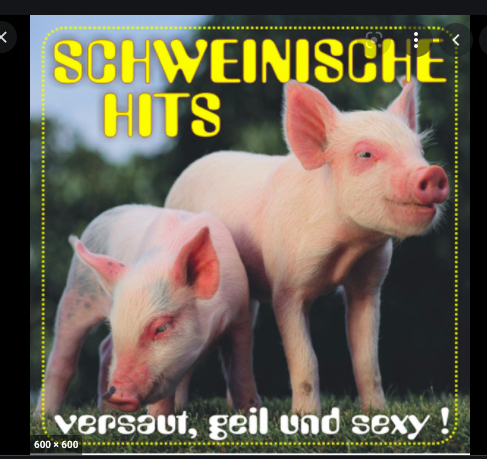The importance of pigs in Austria: From 'grief bacon' to your inner swine dog

When you live in Austria, it soon becomes very obvious that the whole country has a special relationship with pork and pigs.
Pork is widely eaten and one of the cheapest meats you can find in the shops. That's not to mention the bewildering array of pork related products, such as wurst, sausages, hams, bacon (speck) and leberkäse (liver cheese) on sale at various meat counters and Würstelstands (sausage stands) across the country.
Around Christmas and New Year, much pig-related paraphernalia starts to appear in the shops and at Christmas markets. There are pig shaped Christmas market mulled wine mugs, pig shaped key rings, and other ‘good luck pigs’ also known as Glücksschwein.

These pigs made of marzipan are another treat people enjoy around Christmas. (Photo by PATRIK STOLLARZ / AFP)
Pigs are lucky
The reason? In Austria pigs are considered very lucky. If someone has a stroke of luck, this is often referred to as having “had a pig” or “Schwein haben”.
There are various theories as to why pigs are considered so lucky. The prevailing one is that when Austria was primarily a country of farmers, having a pig meant there was enough to eat in the lean winter months.
The pig is so important in Austrian culture that there are many expressions relating to these animals. For example the well-to-do suburbs in Lower Austria around Vienna are jokingly referred to as the Speckgürtel or Bacon Belt. Another theory is the pig relates to the ace of cards in a deck, with the highest value card being called the sow (Sau).
Grief bacon
One famous use of bacon to express a concept in German is Kummerspeck, or bacon grief, perhaps better translated into English as ‘comfort eating’. It refers to something many of us may have succumbed to during the dark days of the Corona pandemic, putting on weight by eating your feelings in the form of bacon. It can also refer to a lovesick person, trying to ease the pain with pork products.
On the other hand, Schweinisch can also mean dirty in a sexual sense.

One useful phrase if someone is trying to get to know you too quickly is “Wir haben zusammen noch keine Schweine gehütet” or “we haven’t kept any pigs together yet”. This means “we don’t know each other well enough for that”.
And while in England we might say that pigs might fly, in German the expression is that "I believe my pig might whistle" or "Ich glaub mein Schwein pfeift". although this expression is more widely used in Germany than Austria.
Let the pig run free
You can also use pigs for emphasis, and say somewhere is “pig cold” or “pig warm” (schweine kalt or schweine heiß), or even "really good" "saugut". And if you go to a party, you can "die Sau rauslassen", or let the pig out, if you mean you want people to let their hair down, like a pig running joyously free in the open air.

These guys have conquered their inner Schweinehund . (Photo by JOE KLAMAR / AFP)
Pigs are not always mentioned in a positive light. For example, if you are feeling lazy at the gym, your trainer might exhort you to “überwinden deine innerer Schweinehund!” or “overcome your inner pig dog”. The innerer Schweinehund, or inner "pig dog" is used to represent a weak inner self or a lack of motivation.
Of course, if you do succeed, you may find yourself sweating like a pig, in which case you can say "Ich schwitze wie eine Sau". And it's also common to call a child who has got filthy rolling around in the mud, a kleines Ferkel or little piglet.

Fans protest against police action with a banner that reads "bull pigs" at a German first division Bundesliga football match in 2013. (Photo by PATRIK STOLLARZ / AFP)
One interesting variant of the use of the word "pig" as a derogatory word aimed at police officers is the word Bullenschweine, which combines bulls and pigs in one word. This a well known insult to police officers.
It's all sausage to me
One final slightly pig related phrase you may find useful in Austria or other German speaking countries is the expression “Es ist mir wurscht", or “it’s all sausage to me”. This is a slightly more colloquial form of “egal”, which means “I don’t care” about something or someone.
One theory is that this expression comes from the practise of butchers taking their most unappetising cuts of meat leftover at the end of the day, and making it into sausage.
Comments
See Also
Pork is widely eaten and one of the cheapest meats you can find in the shops. That's not to mention the bewildering array of pork related products, such as wurst, sausages, hams, bacon (speck) and leberkäse (liver cheese) on sale at various meat counters and Würstelstands (sausage stands) across the country.
Around Christmas and New Year, much pig-related paraphernalia starts to appear in the shops and at Christmas markets. There are pig shaped Christmas market mulled wine mugs, pig shaped key rings, and other ‘good luck pigs’ also known as Glücksschwein.

Pigs are lucky
The reason? In Austria pigs are considered very lucky. If someone has a stroke of luck, this is often referred to as having “had a pig” or “Schwein haben”.
There are various theories as to why pigs are considered so lucky. The prevailing one is that when Austria was primarily a country of farmers, having a pig meant there was enough to eat in the lean winter months.
The pig is so important in Austrian culture that there are many expressions relating to these animals. For example the well-to-do suburbs in Lower Austria around Vienna are jokingly referred to as the Speckgürtel or Bacon Belt. Another theory is the pig relates to the ace of cards in a deck, with the highest value card being called the sow (Sau).
Grief bacon
One famous use of bacon to express a concept in German is Kummerspeck, or bacon grief, perhaps better translated into English as ‘comfort eating’. It refers to something many of us may have succumbed to during the dark days of the Corona pandemic, putting on weight by eating your feelings in the form of bacon. It can also refer to a lovesick person, trying to ease the pain with pork products.
On the other hand, Schweinisch can also mean dirty in a sexual sense.

One useful phrase if someone is trying to get to know you too quickly is “Wir haben zusammen noch keine Schweine gehütet” or “we haven’t kept any pigs together yet”. This means “we don’t know each other well enough for that”.
And while in England we might say that pigs might fly, in German the expression is that "I believe my pig might whistle" or "Ich glaub mein Schwein pfeift". although this expression is more widely used in Germany than Austria.
Let the pig run free
You can also use pigs for emphasis, and say somewhere is “pig cold” or “pig warm” (schweine kalt or schweine heiß), or even "really good" "saugut". And if you go to a party, you can "die Sau rauslassen", or let the pig out, if you mean you want people to let their hair down, like a pig running joyously free in the open air.

Pigs are not always mentioned in a positive light. For example, if you are feeling lazy at the gym, your trainer might exhort you to “überwinden deine innerer Schweinehund!” or “overcome your inner pig dog”. The innerer Schweinehund, or inner "pig dog" is used to represent a weak inner self or a lack of motivation.
Of course, if you do succeed, you may find yourself sweating like a pig, in which case you can say "Ich schwitze wie eine Sau". And it's also common to call a child who has got filthy rolling around in the mud, a kleines Ferkel or little piglet.

One interesting variant of the use of the word "pig" as a derogatory word aimed at police officers is the word Bullenschweine, which combines bulls and pigs in one word. This a well known insult to police officers.
It's all sausage to me
One final slightly pig related phrase you may find useful in Austria or other German speaking countries is the expression “Es ist mir wurscht", or “it’s all sausage to me”. This is a slightly more colloquial form of “egal”, which means “I don’t care” about something or someone.
One theory is that this expression comes from the practise of butchers taking their most unappetising cuts of meat leftover at the end of the day, and making it into sausage.
Join the conversation in our comments section below. Share your own views and experience and if you have a question or suggestion for our journalists then email us at [email protected].
Please keep comments civil, constructive and on topic – and make sure to read our terms of use before getting involved.
Please log in here to leave a comment.